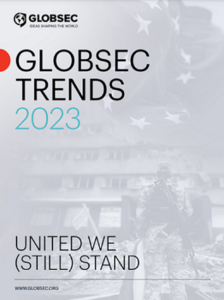Slovakia is faced with a decision between strengthening its fragile democracy or potentially veering towards autocracy driven by xenophobia, alignment with Russia and illiberal leaders feeling that it’s their time to cement their hold on the system for a very long time, Viera Žúborová writes for Visegrad Insight.
Slovakia’s upcoming election could weaken western support for Ukraine, with Russia-friendly parties expected to make a comeback in the central European country, The FT reports:
Successive governments in Bratislava have maintained military support for Kyiv in its defence against Russian aggression. But populist and far-right parties with varying degrees of sympathy for the Kremlin’s war in Ukraine have a good chance of joining the government that will emerge from the September 30 snap election, raising concerns about another EU and Nato member becoming less supportive of Kyiv.
Leading in the polls is Smer, the party of former prime minister Robert Fico, who resigned in 2018 following anti-corruption protests sparked by the murder of an investigative journalist and his fiancée. Smer has been tipped to win 20 per cent of the vote but would require several coalition partners to govern.

Credit: POMED
The upcoming vote stands out as “one of the very few elections where helping Ukraine is part of the campaign and where the leading party is against this help”, said Dominika Hajdu, senior analyst at Slovak think-tank Globsec, a partner of the National Endowment for Democracy (NED). “It’s an election that can strongly influence the unity of the EU and Nato in terms of support of Ukraine.”
Political analyst Grigorij Meseznikov said there is also “nostalgia for the communist regime” as “many Slovaks believe they had a better life during the Soviet era”.
This makes the country fertile ground for an online disinformation network that spreads hoaxes and Russian narratives. “For Russia and Russian propaganda, Slovakia is relatively easy prey,” Meseznikov told AFP.
“Influential politicians like Robert Fico have also been nourishing these pro-Russian sentiments,” he added.
Martin Sklenár, Slovakia’s Minister of Defence, sits down with CEPA’s Catherine Sendak to discuss the role of Slovakia in fostering transatlantic cooperation and continued support for Ukraine (above).
“For #Russia and Russian propaganda, #Slovakia is relatively easy prey,” former @ThinkDemocracy fellow @GMeseznikov told @AFP. “Influential politicians like Robert Fico have also been nourishing pro-Russian sentiments,” he added. https://t.co/xdYuhYuZXk
— Democracy Digest (@demdigest) September 14, 2023







